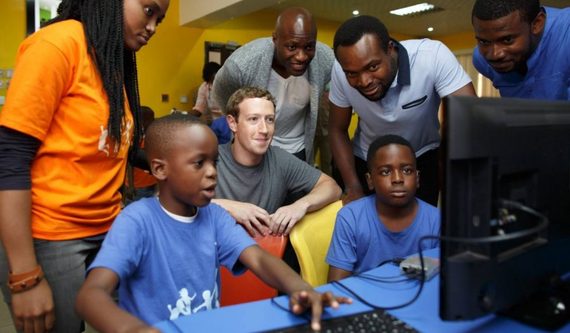When some think about entrepreneurship, they imagine how the Gates, Brins, Winfreys, and Dangotes of the world are feeding economic mobility and self-sufficiency. For me, however, the story of entrepreneurship not reserved for a select and privileged few begins in Lagos, Nigeria.
Growing up in Nigeria I was surrounded by entrepreneurship, although we simply referred to it as "doing business." I saw that entrepreneurial spirit in mother who ran three profitable businesses at any given time; my uncle, the medical doctor, who sold shoes and suits bought during his family's Italian vacations to friends and family; and the street-hawkers who had everything I could possibly need to get through 3 hours in traffic on Third Mainland Bridge.
From the very highly educated to those whose only education came from life lessons, the hustler mentality born out of economic need was alive and well. No matter your stated 9 to 5 (or lack thereof), you were expected to hold the moniker of businessman or businesswoman. And those who did were respected for it. So it came as no surprise to my father that my plan to pay for college was simply to "invent something." (I still believe earning a full scholarship stifled my ability to have invented the Hoverboard).
In Nigeria, as in much of Africa, there has always been a cultural expectation to create opportunities for yourself and foster your own self-sufficiency. This need to be entrepreneurial is as much a part of what it means to be Nigerian, as accumulating as many degrees as possible.
Turns out, I'm not the only one who sees this. Last week, Facebook founder and CEO, Mark Zuckerberg made a "surprise" visit to Nigeria. While touring the nation's economic capital, Lagos, Zuckerberg said he chose to come there first "because of the vibrant developers and entrepreneurial ecosystem." As I heard this, I thought, of course!
Zuckerberg's first stop was to Co-creation Hub Nigeria (CcHUB) in Yaba, which connects and clusters those innovating around many social problems in Nigeria. While reflecting on his time in Lagos at a Town Hall Zuckerberg said, "the reason I am here now is because this is where a lot of the future will get built." I couldn't agree more.
In Africa, there is a natural disposition towards innovation - a passion for living that focuses on solutions rather than problems - within this innate ability lies the key to sustainable development in Africa but this cannot be realized without the right type of investments. Take for example Mobile Banking. Africa is leading the way in the adoption of mobile banks. According to the World Bank, 16 percent of sub-Saharan mobile users have used their phones for banking purposes. This is a larger portion than any other global region and it is still growing. With further development, mobile payment applications could generate as much as $1.5 billion in sales by 2019. This is an economically viable investment that also solves serious social problems for underserved communities, including reducing the vulnerability to theft suffered by cash-only vendors, settling bills without the hassle of expensive and time-consuming travel, and access to loans for the unbanked majority.
Revenue potential in a number of industries continues to drive interest in Africa but for the most part, western investments in Africans has tended to focus on aid and humanitarian relief. Although necessary, the long-term development plan for Africa must also include investments in indigenous entrepreneurs and startups. Africa's growth and sustainability require people innovating around issues peculiar to Africa, and Africans are doing that better than anyone else.
On the list of startups that Zuckerberg visited is one that he is already backing, Andela - a solutions focused enterprise that trains engineers in Africa and places them in global tech jobs. The Chan-Zuckerberg Initiative's $24 million investment in this startup co-founded by Nigerian Iyinoluwa Aboyeji, models investments in Africans innovating in support of Africa.
Andela first caught my attention last year while exploring technology solutions that allow for greater inclusion of underserved communities in the global workforce. Last September, I toured the Yaba campus with Iyinoluwa and met some of the fellows Andela had trained and placed with various global tech companies. I witnessed first hand the challenges inherent in closing the gap between where talent lives and opportunities exists - with the most glaring being poor infrastructure. But, what I also saw was a burgeoning social enterprise responding to Africa's tech training deficits through a self-funding model of education; empowering women through increased participation in the workforce; and solving remote work concerns around infrastructure deficits and isolation.
In the two years since its inception, Andela has trained just under 200 engineers, accepting them from a pool of 40,000 applicants. In an Africa currently home to 1.2 billion people with a projected rise to 2.4 billion by the year 2050, there is an urgent need to close the skills gaps and significantly increase access to jobs.
After leaving Andela, I headed over to the Nigeria-focused tech startup investment fund 440 for Deal Weekend Lagos - a 24-hour event where shortlisted startups compete to receive an equity investment of between $100k and $250k. There, I was surrounded by a community of innovators committed to advancing Nigeria's tech ecosystem. Throughout the event was a palpable determination to find and nurture innovation - impassioned young Africans fighting for solutions for themselves and their communities.
Africa has the youngest, fastest-growing population in the world, with more people joining the labor force over the next 20 years than the rest of the world combined. This growth cannot be sustained by a purely resource-based economy, therefore, accommodations must be made to support a shift to an entrepreneurial and knowledge-based economy. Nurturing the CcHUBs, Andelas, and 440s of Africa through investments, both from within Africa and from the West, gets us closer to Africa's best future which is undeniably tied to the success of Africa's diversity of entrepreneurs.
